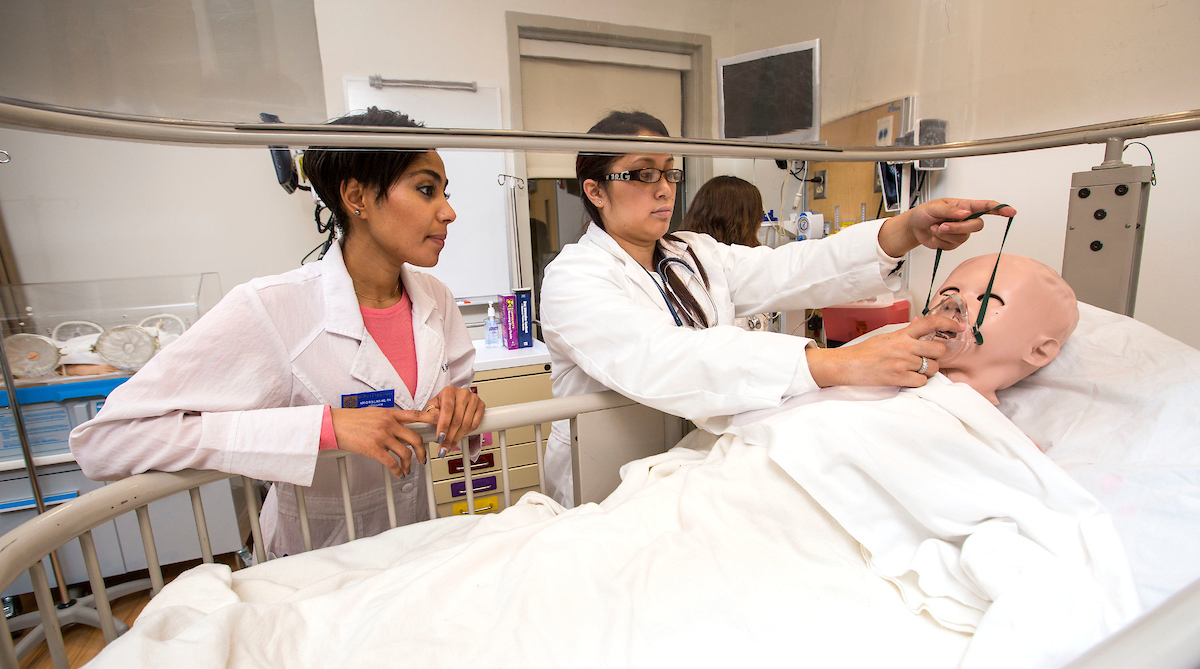 DePaul University's School of Nursing is poised to meet upcoming changes in Illinois' health care industry. (DePaul University/Jamie Moncrief)
DePaul University's School of Nursing is poised to meet upcoming changes in Illinois' health care industry. (DePaul University/Jamie Moncrief)
The Illinois health care industry is on the precipice of how care is provided due in part to recent amendments to the Nurse Practice Act.
"The amendment allows nurse practitioners to write prescriptions and that is definitely going to change health care in Illinois," says Matthew Sorenson, director of DePaul University's School of Nursing, which celebrated 70 years last year. "Prior to this, nurse practitioners could only work with prescribing physicians."
The amended Nurse Practice Act grants advanced practice registered nurses who are licensed in Illinois and certified as a nurse practitioner, nurse midwife or clinical nurse specialist the ability to practice without a written collaborative agreement with a licensed physician.
Other factors affecting industry change include an aging nursing workforce and the continued demand for nurses. Sorenson explains what that means for Illinois residents and DePaul's role in finding solutions.
Let's start with the basics. What is the difference between a nurse, a nurse practitioner and a physician's assistant?
A nurse is someone who has passed a licensing exam after completing a college degree. It can be an associate degree, though in areas like Chicago, health care providers are looking to hire nurses with more advanced degrees because studies have shown that higher education decreases medical errors.
A nurse practitioner is someone with at least a master's degree in nursing who has passed a certification exam. Nurse practitioners typically work in acute or primary care areas.
A physician's assistant typically has a master's degree but typically works in conjunction with a licensed physician. Most physician's assistant programs are tied to medical schools. Physician's assistants generally have a broader range of medical training than nurse practitioners and may not have the same kind of autonomy as a nurse practitioner.
Tell me about the amended Illinois law and how it applies to the nursing field.
It took a while for Illinois to push through, but it is definitely going to change health care in Illinois. The state becomes the 23rd in the nation to allow full practice status to nurse practitioners. That means they can operate individual practices where they can bill for services.
Physicians have been abandoning primary care practice because it doesn't pay as well as specialization areas. Nurse practitioners are the future of primary care and the number of nurse practitioners in Illinois has been growing at a steady rate in the last decade.
What are some of the challenges in the nursing field?
The nursing shortage is still very acute because the workforce is aging and there are so many more places for nurses to work these days from hospitals to clinics to home health care. Some schools have trouble meeting the demand for nurses because they are limited by class size. That's not the case in cities like Chicago. Our challenge is dwindling clinical space for nursing students to receive training. More clinical sites in Chicago are reducing the number of students they take because health care systems are dealing with staffing following a merger.
How is DePaul positioned to respond to industry changes?
We're in the process of bringing back a nurse practitioner training program in our registered nurse to master's degree program because of market demand. That degree program is for nurses with an associate degree who want a master's degree in nursing.
What other changes have you noticed in recent years?
More nurses are getting bachelor's degrees, according to the National Council of State Boards. In 2008 nationwide, there were 76,000 nurses with associate degrees compared to 50,000 with a bachelor's degree. Now there are 79,000 nurses with associate degrees compared to 76,000 with a bachelor's degree.
The average age of a nursing student at DePaul is now 28, which is down in the past three years, and the starting salary in Illinois has risen to $65,000 from $58,000.
At DePaul, we're seeing more men in the industry. There used to be only one or two men in a cohort and now nearly 2 percent of graduates are men. We're also seeing a lot more students from Southeast Asian, Eastern Europe and Nigeria.